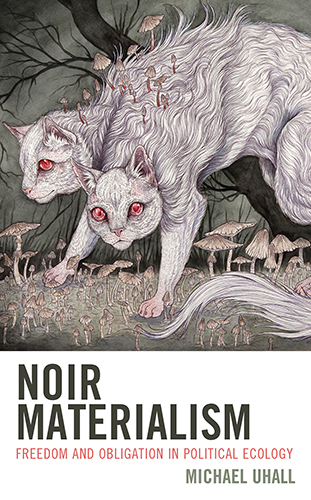I think of political theory in terms of Hanna Fenichel Pitkin’s definition: it is “the attempt to define the interface between what must be accepted as necessary and what can be altered through active intervention.” Consequently, my research investigates questions related to (a) why we are failing to navigate emerging security crises (like climate change, democratic backsliding and political decay, and rapid cultural, spatial, and technological transformations) and (b) how conceptual engineering in political theory might help us mitigate or adapt to such circumstances more effectively. My first book, Noir Materialism: Freedom and Obligation in Political Ecology, is available from Bloomsbury Publishing. Other scholarly work appears in Configurations, Contemporary Political Theory, Critical Horizons, Nature and Culture, Rhizomes, and elsewhere.
My second book (Theory of the Alien: Astropolitics, Space Power, and the Outside) is under contract with Routledge. It explores my burgeoning interest in astropolitics (the geopolitics of outer space) and the relatively recent emergence of outer space as an economic, political, and warfighting domain. There is currently very little political theory relating to this topic, despite, e.g., Hannah Arendt’s observation in 1958 that the Sputnik launch in 1957 was an event “second in importance to no other, not even to the splitting of the atom,” and the book addresses fundamental questions about the future of politics on and off planet Earth, as well as delineates ways in which our political, spatial, and strategic imagination is deeply informed by categories and concepts of the exogenous, or what is considered to be outside the scope of the traditionally political. In the book, I engage extensively with the politics of the space community, NASA, and the United States Space Force, as well as with ongoing theoretical puzzles related to the future of territory and war, space law related to national security and space exploration, the conceptual and cultural history of the extraterrestrial hypothesis, and philosophical anthropology at a planetary scale. Related material will appear soon as a chapter in an edited volume from Oxford University Press, and complementary materials have been published in Vault of Culture and Limina.
More generally, my research interests include contemporary political theory, cultural and intellectual history, political geography, philosophies of technology, security and strategic studies, and film and literary criticism. Longer-term research projects include an intensive philosophical study of CIA counterintelligence chief James Jesus Angleton and an extended scholarly treatment of conjunctions of vitalism and rationalism (via close readings of Plato’s Phaedo, a comparative study of Gilles Deleuze and Ludwig Klages, and critical engagements with Ray Brassier, Sylvain Lazarus, and Sabina Spielrein). In addition to my own research program, I have directed both independent and sponsored research groups on a wide range of topics, such as Machiavelli’s political psychology, the political realism of Henry Kissinger, and Paul Feyerabend’s philosophy of science. Very often, I find myself returning to Seth Benardete, Wilfred Bion, Helmuth Plessner, and Gilbert Simondon.
